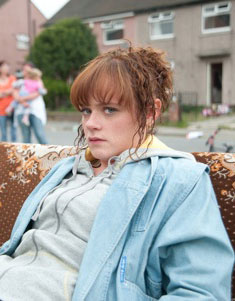LFF: The Arbor – 2*
 Clio Barnard’s film The Arbor is thought provoking, primarily because of the social issues rising from life on a former rough estate that it flags. However, much as such issues capture the attention, their importance should not be confused with how good/bad a film it is at its core. The Arbor’s style of actors lip-synching to tape-recorded testimony by the family, friends and associates of working-class playwright Andrea Dunbar (Rita, Sue and Bob Too!) may prove too disconcerting for some to marry together. It does take some getting used to and appears like out-of-sync audio with the visuals at first, even with some commendable acting performances. That said, and playing devil’s advocate, it could be argued that this makes the story more immediate and impacting, though.
Clio Barnard’s film The Arbor is thought provoking, primarily because of the social issues rising from life on a former rough estate that it flags. However, much as such issues capture the attention, their importance should not be confused with how good/bad a film it is at its core. The Arbor’s style of actors lip-synching to tape-recorded testimony by the family, friends and associates of working-class playwright Andrea Dunbar (Rita, Sue and Bob Too!) may prove too disconcerting for some to marry together. It does take some getting used to and appears like out-of-sync audio with the visuals at first, even with some commendable acting performances. That said, and playing devil’s advocate, it could be argued that this makes the story more immediate and impacting, though.
On first glance, The Arbor appears to be about how fame came to Dunbar, but it actually takes a different tangent and explores the impact of her actions (or lack of) on her family. Far from paying homage to Dunbar, this film doesn’t depict her in a favourable light, as a person or a mother. In fact she isn’t that likeable at all – tragic end aside, especially for any non-fans of her work, and becomes of little consequence in the film. Whether this was Barnard’s intention is hard to tell, but maybe Dunbar fans have a different opinion?
The more harrowing and captivating ‘sub-story’, which actually gives this film its real zest, is that of her Asian daughter, Lorraine (played by Manjinder Virk), and her disturbing account of life growing up in 1970s’ racist Bradford as a mixed-race kid. Again, the film grabs you because of the issues of drugs and infant mortality it recalls in her later years, as well as Lorraine’s ‘raw deal’ that she’s dealt. Lorraine may well have cause to feel that way, and whilst her narrative pulls on the heartstrings, you are very aware of watching a construct of events that feels slightly reproachable at times.
There is also the rather odd reconstruction of Dunbar’s play The Arbor set right on The Arbor’s green itself, ironically starring George Costigan, who played Bob in Rita. Whether this is meant as an introduction or a fresher to Dunbar’s work could be taken any way, but it certainly reminds you – as if you needed to be told – that you are watching a recount of a true story, plus the acting is commendable, and it’s the support of the local community looking on that gives this film its proud roots.
It’s hard to sell The Arbor, unless you have an interest in the playwright or in the area. It feels like another working-class tale of hardship – without the triumph of escaping it, much like a Ken Loach work. It also feels somewhat confused as to what it wants to be: fact based as fiction (as in the reconstruction alfresco), or pseudo-documentary with the archive footage of Dunbar. In fact it’s like snippets of both sewn together, but not necessarily harmoniously, and a Barnard experiment in how to offer a few novel ways of portraying gritty real-life tales.
2/5 stars
By L G-K